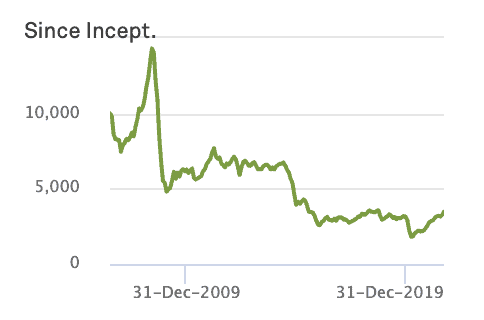It took me a while to learn how to manage my stocks and to practice […]
GSG and DBC are popular exchange-traded fund, with a focus on Commodities.
Both are incorporated in the USA and enable one to be exposed to a broad range of commodities. If you want to get a convenient access to energy, industrial and precious metals, agricultural, and livestock markets, you can consider these ETFs. Either would be helpful in diversifying your portfolio to incorporate an exposure to broad-based commodities.
This is a comparison of GSG vs DBC. Learn how to analyse which index fund is a better investment.
What are the drivers for Commodities?
A rise in inflation, tighter oil supplies, strong demand from the industrial sector and crop-friendly weather are some factors that can impact the prospects for commodity markets.
GSG: iShares S&P GSCI Commodity-Indexed Trust
The fund invests in a diversified group of commodities and tracks S&P GSCI Total Return Index. iShares S&P GSCI Commodity-Indexed Trust (the 'Trust') seeks to track the results of a fully collateralized investment in futures contracts on an index composed of a diversified group of commodities futures.
DBC: Invesco DB Commodity Index Tracking Fund
The Fund tracks the DBIQ Optimum Yield Diversified Commodity Index.
DBC uses futures contracts to maintain exposure and selects them based on the shape of the futures curve to minimize contango. It represents 14 commodities drawn from the Energy, Precious Metals, Industrial Metals and Agriculture sectors via futures contracts. The fund’s index aims to maximize the potential roll benefits in backwardation markets and minimize any loss from rolling down the curve in contango markets.
It does so by employing a rules-based approach when it rolls from one futures contract to another for each commodity. Rather than rolling based on a predefined schedule (e.g. monthly), the index rolls to futures (within the next 13) which, by its rules, generates the maximum implied roll yield. Structured as a commodity pool, investors should expect a K-1 at tax time. The fund and the index are rebalanced and reconstituted annually in November.
It's suitable for investors who want a cost-effective and convenient way to invest in commodity futures.
GSG vs DBC: Historical Performance
GSG

DBC

| GSG | DBC | |
| 3 Month Return | 9.94% | 10.67% |
| YTD Return | 42.50% | 43.95% |
| 1 Year Return | 59.47% | 58.62% |
| 3 Year Return | -0.45% | 7.05% |
| 5 Year Return | 2.92% | 7.37% |
GSG vs DBC: : Fund top holdings
GSG

DBC

GSG vs DBC: Sector breakdown
| GSG | DBC | |
| Energy | 60.09% | 47.53% |
| Agriculture | 17.52% | 25.28% |
| Industrial Metals | 11.92% | 15.17% |
| Livestock | 5.99% | 12.02% |
| Precious Metals | 4.48% | - |
GSG vs DBC: key findings and overlap
| GSG | DBC | |
| Fund Manager | iShares by BlackRock | Invesco |
| Fund Inception | Jul 10, 2006 | Feb 3, 2006 |
| Underlying Index | S&P GSCI | DBIQ Optimum Yield Diversified Commodity Index Total Return |
| NAV | $1.36B | $2.67B |
| Shares outstanding | 78,100,000 | 127,000,000 |
| Volume | 1,512,603 | 4,447,079 |
| Expense ratio | 0.75% | 0.88% |
Caveat
- Investments in futures contracts
- Speculative nature of an investment based upon the Fund's trading which takes place in very volatile markets
- Frequency in the movement in market prices of the underlying futures contracts could cause large losses.
More information here
How to buy
You can consider using TDAmeritrade, Tiger Brokers or moomoo.
Read the guides here: moomoo, Tiger Brokers
Conclusion
Although DBC has a higher 5-year return than GSG (7.27% vs 2.96%), it has a higher expense ratio.
Some comparison metrics to consider are expense ratio, issuer, AUM, average daily volume, performance and holdings.
Related article
VTI vs VOO: which index fund is a better investment (updated 2020)
Thank you for reading! Please like my Facebook page to get the latest updates.







